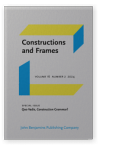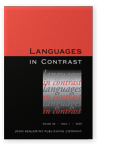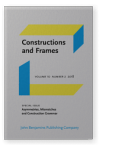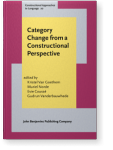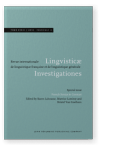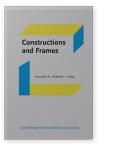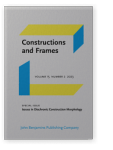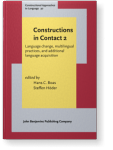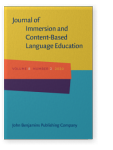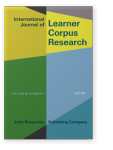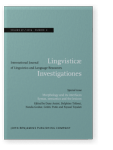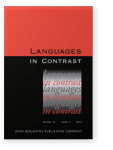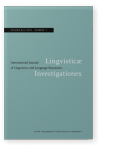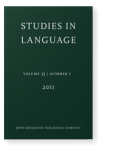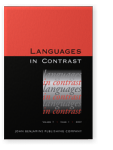Kristel Van Goethem
List of John Benjamins publications for which Kristel Van Goethem plays a role.
Journals
ISSN 1387-6759 | E-ISSN 1569-9897
Titles
Asymmetries, Mismatches and Construction Grammar
Edited by Nikos Koutsoukos, Kristel Van Goethem and Hendrik De Smet
Special issue of Constructions and Frames 10:2 (2018) v, 183 pp.
Subjects Cognition and language | Functional linguistics | Syntax | Theoretical linguistics
Category Change from a Constructional Perspective
Edited by Kristel Van Goethem, Muriel Norde, Evie Coussé and Gudrun Vanderbauwhede
[Constructional Approaches to Language, 20] 2018. vii, 314 pp.
Subjects Historical linguistics | Morphology | Syntax | Theoretical linguistics
French Syntax in Contrast
Edited by Karen Lahousse, Béatrice Lamiroy and Kristel Van Goethem
Special issue of Lingvisticæ Investigationes 33:2 (2010) vi, 170 pp.
Subjects Computational & corpus linguistics | Generative linguistics | Lexicography | Romance linguistics | Syntax | Theoretical linguistics
2025 The fate of ‘pseudo-’ words: A contrastive corpus-based analysis Languages in Contrast 25:1, pp. 23–50 | Article
The present study examines the fate of the neoclassical combining form pseudo- in eight European languages, belonging to Germanic (Danish, Dutch, English, German and Swedish) and Romance (French, Italian, Spanish). In order to gain a better understanding of the synchronic morphological behaviour… read more
2024 Dutch compound constructions in additional language acquisition: A diasystematic-constructionist approach Constructions and Frames 16:1, pp. 64–99 | Article
Studies have demonstrated that Dutch has a much stronger tendency towards compounding than French (e.g., Du. badkamer vs Fr. salle de bains ‘bathroom’) when adopting a restrictive approach of compounding in which the presence of prepositions and/or internal inflection in multi-word expressions… read more
2023 Review of François (2021): L’expansion pluridisciplinaire des grammaires de constructions Issues in Diachronic Construction Morphology, Norde, Muriel and Graeme Trousdale (eds.), pp. 282–290 | Review
2021 Intensifying constructions in second language acquisition: A diasystematic-constructionist approach Constructions in Contact 2: Language change, multilingual practices, and additional language acquisition, Boas, Hans C. and Steffen Höder (eds.), pp. 375–428 | Chapter
This study analyzes the acquisition of Dutch intensifying constructions by French-speaking learners in Belgium. Additionally, it compares learners enrolled in Content and Language Integrated Learning (CLIL) programs with learners following traditional second language instruction. Within the… read more
2020 Effects of input on L2 writing in English and Dutch: CLIL and non-CLIL learners in French-speaking Belgium Journal of Immersion and Content-Based Language Education 8:2, pp. 173–199 | Article
This study aims to explore the impact of formal and informal input on learners’ variability in writing, and to compare two target-language conditions (Dutch and English) in CLIL and non-CLIL settings in French-speaking Belgium. A regression model shows that CLIL is a significant predictor of L2… read more
2019 Intensifying constructions in French-speaking L2 learners of English and Dutch: Cross-linguistic influence and exposure effects International Journal of Learner Corpus Research 5:1, pp. 63–103 | Article
We investigate the cross-linguistic influence and the (longitudinal) impact of Content and Language Integrated Learning (CLIL) on the acquisition of intensifying constructions, using corpora of written French, Dutch, and English productions by L1 speakers, and L2 English and L2 Dutch produced by… read more
2018 Asymmetries, mismatches and construction grammar: An introduction Asymmetries, Mismatches and Construction Grammar, Koutsoukos, Nikos, Kristel Van Goethem and Hendrik De Smet (eds.), pp. 123–146 | Review article
2018 Chapter 7. The emergence of a new adverbial downtoner: Constructional change and constructionalization of Dutch [ver van X] and [verre van X] ‘far from X’ Category Change from a Constructional Perspective, Van Goethem, Kristel, Muriel Norde, Evie Coussé and Gudrun Vanderbauwhede (eds.), pp. 179–205 | Chapter
The English expression far from, denoting spatial or metaphorical distance, has developed into an adverbial downtoner (De Smet, 2012). In this corpus-based study, our first purpose is to analyze to which degree the Dutch counterparts of the English [far from X] construction, that is [ver van X] and… read more
2018 Chapter 1. Category change from a constructional perspective: Introduction Category Change from a Constructional Perspective, Van Goethem, Kristel, Muriel Norde, Evie Coussé and Gudrun Vanderbauwhede (eds.), pp. 3–12 | Chapter
2014 Bleaching, productivity and debonding of prefixoids: A corpus-based analysis of ‘giant’ in German and Swedish Morphology and its interfaces: Syntax, semantics and the lexicon, Amiot, Dany, Delphine Tribout, Natalia Grabar, Cédric Patin and Fayssal Tayalati (eds.), pp. 256–274 | Article
In this paper, we present a contrastive survey of a morpheme originally meaning ‘giant’ in German and Swedish. In both languages, this morpheme has developed into a prefixoid with simile or intensifying meaning. More recently, these prefixoids have been shown to occur as free morphemes as well, and… read more
2014 How nouns turn into adjectives: The emergence of new adjectives in French, English and Dutch through debonding processes Languages in Contrast 14:2, pp. 251–277 | Article
This study focuses on French, English and Dutch adjectives that arise through debonding from N+N (and N+A) compounds or compound-like sequences (e.g. the adjectival uses of English ‘key’ and French clé “key”). Debonding is a type of degrammaticalization defined by Norde as “a composite change… read more
2012 Le statut des séquences “N+N à N2 productif”: Le cas de N-clé Lingvisticæ Investigationes 35:1, pp. 76–93 | Article
This article investigates the status of French N+N constructions in which the N2 productively combines with different N1’s (e.g. réunion marathon ‘marathon meeting’, examen marathon ‘marathon exam’, plaidoyer marathon ‘marathon plea’, etc). In the literature, this construction has been analyzed in… read more
2011 From adjective to affix in Dutch and French: The influence of word order patterns on grammaticalization Studies in Language 35:1, pp. 194–216 | Article
This study, which builds on previous work on the grammaticalization of lexemes into affixes (affixization), is devoted to the evolution from adjective to affix (prefix or suffix) in Dutch and French. By means of several case studies (oud- ‘old’, dol- ‘mad’, nouveau- ‘new’, -vriendelijk ‘friendly’)… read more
2007 French and Dutch preverbs in contrast: A case study of French sur- and Dutch op- and over- Languages in Contrast 7:1, pp. 83–99 | Article
French sur and Dutch op (“on, upon”) can be a considered matching pair when they are used as prepositions: e.g. le livre sur la table/het boek op de tafel (“the book on the table”). However, used as prefixes, or in particular as preverbs, the similarities between sur- and op- seem to be much… read more
